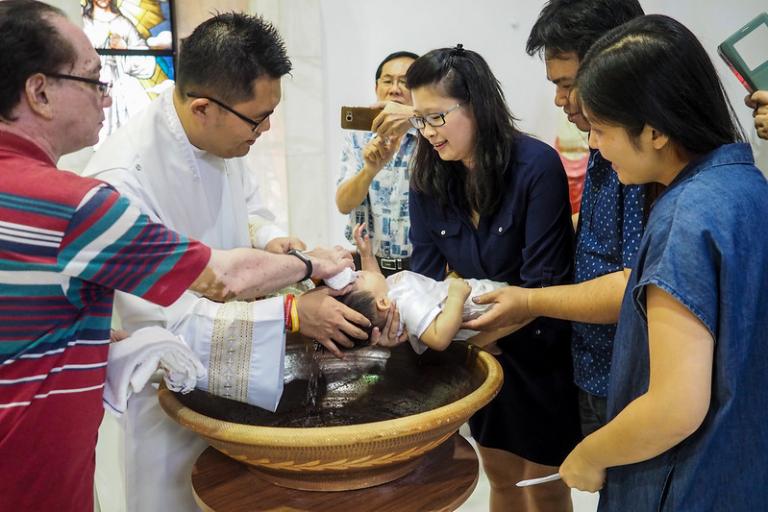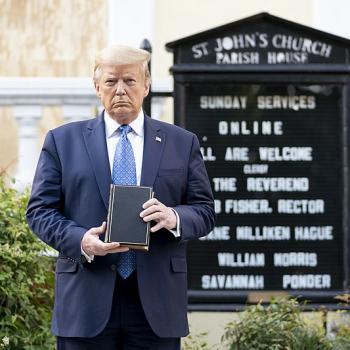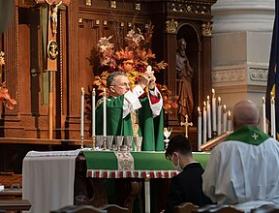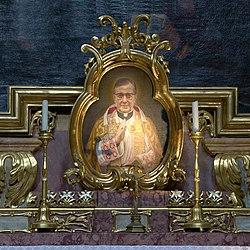
Anytime you make a law, issue a ruling or give a legal opinion that constitutes law, you are setting events in motion that will have unintended consequences. The more absolute the language you use in making this law, the more harsh the unintended consequences are going to be.
That statement is a simple fact of lawmaking. It expresses the hard and unavoidable reality of governance of any sort, including governance of the Catholic Church.
A secondary reality of lawmaking is that you must be able to set your almighty ego aside and consider those unintended consequences before you issue, promulgate, legislate the thing. Then, when things happen you didn’t foresee, you’ve got to be willing to set your ego aside once again, go back and fix the mistakes you made.
The Congregation of the Doctrine of the Faith in the Vatican recently issued what it calls a “response” to a question that some unnamed someone asked it concerning the words the priest or deacon must use when baptizing people. My colleagues Fellow Dying Inmate and Fr Pablo Migone have both written about it.
This “response” is directed only at English-speaking Catholics. The simple — and obvious — reason for this is that it involves the use of pronouns in a way that many other languages are incapable of doing.
For instance, Aramaic, which is the language Jesus and His Disciples spoke, while it has pronouns (not all languages do) uses pronouns differently than English. This question doesn’t really apply to the words that Jesus Himself spoke when He was told us to
Go therefore and make disciples of all nations, baptizing them in the name of the Father and of the Son and of the Holy Spirit, and teaching them to obey everything I have commanded you. (emphasis mine)
The reason it doesn’t apply is because the Vatican’s ruling is partly about linguistics and partly about form, or, in this case, formulary.
The formulary part of the “response” deals with the free-wheeling changes in the language — and the meaning — of the words of baptism themselves that some priests and deacons have used. Evidently, some clergy in the past decades have indulged themselves in using baptism as an opportunity of editorializing.
They have, according to this Vatican “response,” been baptizing people by saying “In the name of the father and of the mother, of the godfather and of the godmother, of the grandparents, of the family members, of the friends, in the name of the community we baptize you in the name of the Father and of the Son and of the Holy Spirit.” The Vatican says that the clergy in question did this to emphasis the communitarian significance of baptism.
That is, obviously, just plain wrong. Baptism provides graces from God, not the surrounding family members. If baptism doesn’t provide graces that come from God, then it’s just water and the “baptized” is getting wet and nothing more.
The Church has always held that the graces of the sacraments, including those of baptism, flow through the Church. The priest, who represents himself as the Church to the laity, is the conduit of this grace. Family members simply don’t stand in this sacramental line that descends from Peter.
By the same token, when a priest or deacon uses the pronoun “we” instead of “I,” he is signifying that the action of baptism takes place as an active assent of all those present, rather than the priest or deacon who is standing in for Christ.
Nothing is more certain to get the Vatican going than anything that attacks, however obliquely, the fact that it is the priests of the Church, standing in the line of succession from the Apostles through Peter who control and administer the sacraments. Those of us in the laity are just the kids, riding in the back seat of the car while the clergy does the driving. That’s whole reason that the Church itself gives for its own existence.
So, minsters who indulge in what is to most of us a harmless little switch of pronouns by saying “We baptize you” instead of “I baptize you” are challenging the formulary by which the priesthood maintains its standing-in-for-Christ position in the seminal sacrament of the Church. The Church isn’t going to allow that.
Now, I’m fine with the Church insisting on precise language in the administration of the sacraments. That is, after all, what the Church is about. It’s why I’m Catholic in the first place.
I came to the Catholic Church because Christ in the Eucharist called me. I mean that exactly, specifically and literally.
Christ in the Eucharist called me.
So I’m not going to argue when the Church does what the Church does and goes all absolute and literal about the minutiae of how the sacraments are administered in actual practice.
But I do think they need to consider unintended consequences in how they issue their “responses.” Words matter in Vatican “responses” just as much as they do in any legal opinion, law or judicial ruling. Words make laws, and laws, even well intended laws, can do harm, as well as good.
Let’s consider how this thing is playing out in real life.
I’ve read internet convos in which quite a number of the more absolutist Catholics are getting themselves all worked up, wondering if their baptisms were “valid.” These folks are scared they’re not baptized and that they are in peril of hell fire because of it.
Then, there are the folks who think the Church is focusing on teensy nothing much stuff while the world is burning. They’d like to be given hope in a time of chaos and fear, not jabbered at about pronouns and how God’s grace is held captive by a self-deifying priesthood. To them, the whole thing is an absurd teapot tempest created by little men.
I will say, that since this “response” was aimed at English speaking Catholics, and since it was issued at a time when the world’s English-speaking superpower is going through paroxysms of political meltdown while suffering from the worst outbreak of a deadly pandemic anywhere, that this whole thing was ill-timed. These abuses have evidently been going on for decades. Why put this out there in the middle of a worldwide pandemic?
But my real quibble is the way the “response” itself is worded. It reads like a set-up for almost ludicrously bad unintended consequences. These consequences have already started coming around.
One example is a priest in Dearborn, MI, who looked at old videos of his baptism and discovered that he himself was baptized invalidly. According to the Vatican “response,” that meant that he not only had to be re-baptized and reconfirmed, but that his entire ordination process was also “invalid.” He had to be made a deacon again and then ordained again.
This rock then rolls downhill. He’s only been a priest for two years, but I imagine he’s heard a lot of confessions, married a lot of couples and given last rites to lot of dying folk in that time. All of this was “invalid” since he wasn’t really a priest because his baptism way back when was “invalid.”
Presumably, we’re going to be having a lot of remarrying and re-confessing in Dearborn. But what about those last rites? What about the person who confessed a mortal sin on their deathbed? Are they now in hell? Imagine how this must feel to the family members of the people this priest gave last rites. Death doesn’t give do-overs.
Since this practice has been going on for decades, this “response” applies to a lot of people who thought they were baptized. Most of them probably don’t have old home movies to alert them to their plight. Are all their marriages, confessions, and last rites invalid in the eyes of God? Is there a special room in hell for the people who thought they received absolution for their sins but really didn’t?
How many Catholics are out there, going to mass, saying their prayers, confessing their sins, all in vain?
My personal opinion is that none of these folks have to worry. Not one bit. I want to underscore what I’m about to say by emphasizing that I’m not a theologian and I don’t speak for the Church. This is me, speaking for me. I am, I repeat, not a theologian, but I have had a few decades of walking with the Almighty.
Based on my own personal experiences of the love of Christ, I am absolutely convinced and believe without a single doubt that Christ’s love and His mercy are bigger than the Catholic Church. The sacraments are sure conduits of His grace, but they are not the only way He can reach into us and heal us.
I know this. I have experienced the reality of the Holy Spirit reaching into me without the benefit of any Church, priest, preacher or minister of any sort. God didn’t need the Catholic Church to make the universe. And He does not need the Church to save individual souls.
He uses the Church. The priests are conduits of God’s grace that flow through the sacraments that are also conduits of God grace. But God’s grace operates independently of them every moment of every day throughout the whole of creation and it is available to us at any time we seek Him.
God uses the Church. He gifted us with the Church. The sacraments are a gift and a present help in our walk with Him through our lives. They are absolutely real and the graces they confer are also real. I have experienced that. I believe it.
But your soul is not in peril of hell fire because a priest or deacon makes a mistake in how he administers the sacraments. The sin — if there is a sin — is on him, not you.
God supplies what’s lacking in our efforts to reach out to Him. I have experienced this in my own life. He’s like the father, running to the prodigal son in the parable. He loves us. If you reach out to God, He will reach out to you. And He will supply the lacks in any sacrament that any priest anywhere messes up.
The Vatican has set off a rolling storm with the way it worded its “response.” It has made a lot of people afraid for their souls unnecessarily and in a time when what they need from their Church is hope.
It has at the same time alienated a good number of other people and made them question both the sanity of the Church’s religious leadership and the relevance of the sacraments themselves. I understand the insistence of “I” over “We” in the baptism form. But I also know that the way this has been done trivializes both the sacrament and the priesthood in the eyes of many Catholics.
This is due almost entirely to way the “response” was handed down and the wording it used. Lawmaking of any sort is a tricky business. It requires the ability to see around corners to effects in real life. It also requires the humility to correct mistakes.
The men in the Vatican are just people. They make mistakes. They made two mistakes with this “response,” first in the timing and then in the wording they used when they issued it.
They didn’t consider the downstream consequences for many thousands of innocent people involved in invalidating a life-giving and seminal sacrament on which all the other sacraments depend. This “response” and its lack of consideration for unintended consequences has the earmarks of the silo thinking of people who only consult one another.
I agree that the Church is called to preserve the sacraments and keep them pristine. That is, after all, what the Church is about.
I support the gist of the “response.”
But I wish the Vatican would issue a clarification providing sensible relief for the faithful from the terrors of this “response.” They need to say a few words setting things right for the thousands of Catholics who are now in fear because they don’t know if they’re baptized, and for those people who are worried about the souls of their loved ones who have died.
They’re scaring one group of people needlessly and they’re weakening the faith of another group of people, equally needlessly.
I hope they clear this up sooner rather than later. But I’m not holding my breath.
RESPONSES TO QUESTIONS PROPOSED
on the validity of Baptism conferred with the formula
«We baptize you in the name of the Father and of the Son and of the Holy Spirit»QUESTIONS
First question: Whether the Baptism conferred with the formula «We baptize you in the name of the Father and of the Son and of the Holy Spirit» is valid?
Second question: Whether those persons for whom baptism was celebrated with this formula must be baptized in forma absoluta?
RESPONSES
To the first question: Negative.
To the second question: Affirmative.
The Supreme Pontiff Francis, at the Audience granted to the undersigned Cardinal Prefect of the Congregation for the Doctrine of the Faith, On June 8, 2020, approved these Responses and ordered their publication.
Rome, from the Offices of the Congregation for the Doctrine of the Faith, June 24, 2020, on the Solemnity of the Nativity of Saint John the Baptist.
Luis F. Card. Ladaria, S.I.
Prefect✠ Giacomo Morandi
Titular Archbishop of Cerveteri, Secretary












